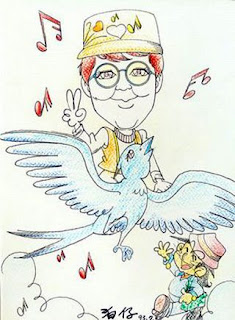Time: 2/27-3/9 2012
Because of the difficulty of getting
the second pass to enter the UN buildings, I spent more time on parallel events
than in the UN Headquarters. The following report includes 3 parallel events at
the Church Center
and 1 CSW event inside the North
Lawn Building
Parallel events
1.
National Development and Rural Women in Asia-Pacific—the
Korean Saemaul Movement and Beyond
Hosted by Korean National Council of Women (KNCW) and International
Council of Women (ICW), Sponsored by Miinistry of Gender Equality and Family,
R.O.K.
Speakers: Mdm. Cosima
Schenk (President, ICW)(replaced by a Japanese Professor), Dr. Jung-Sook
Kim(President, NCW, Korea
Date and place:
03/02, 1st floor chapel, UNCC
This forum,
taking place in the spacious first-floor chapel of the Church Center
As one of the panelists, I shared the innovations
for the improvement of elder women’s health in Taiwan
The
average life expectancy in Taiwan
The
degree of urbanization is reflected in the average life expectancy. Both men
and women in the most urbanized northern Taiwan
have the highest average life expectancy, followed by those in central and
southern Taiwan Taiwan
sees the fastest growth in the average life expectancy, followed by central,
southern and then northern Taiwan
A
2005 survey on the living conditions of the elders (65+) shows that gender is a
significant factor affecting their satisfaction with their lives. Elderly women
generally received less schooling, are economically depend on their husbands or
children, and more of them live alone (14%) than elderly men. Therefore, health
and safety in old age is more of an issue for women than men.
Since 1995,
when Taiwan
In 2007, women’s total medical expense and
medical care service usage rate outnumbered those of men. 94% of women used the
services; only 88% of men used them.
In recent decade, there has been a growing
health consciousness. The Bureau of Health Promotion has adopted a policy to
enable elders to detect and manage chronic diseases. The targets include
raising the percentage of women aged 50-69 undergoing mammograms for breast
cancer to 15.7%, raising the percentage of people aged 50-69 to undergoing
fecal occult blood tests to 10.4%(13% for women), reducing smoking rate among
elders to 12.1% (2% for women) etc. Special attention has been given to the
prevalence of osteoprosis among aged women in menopause education. A toll-free
hotline is put in place to serve postmenopausal women. The Agriculture Council
has organized elders in rural areas to engage in recreational activities, such
as dancing and singing, and offer them opportunities of performance.
NGOs and social enterprises have also taken the
initiative to promote exercise habits in urban and rural communities. Sharing
the same purpose of improving one’s own health and helping others, they adopted
different measures, such as promoting qigong
exercise, and urging elders to care for each other.
Some
participants pointed out, at the end of the forum, that too little attention
was paid to elder women in this year’s CSW activities.
2. Combating the Effects of Climate Change on Rural Women in
Africa
Hosted by Femmes Africa Solidarité
Speakers: Anne Anderson, Irish ambassador
to UN, Harriette Williams from Sierra Leone, Bernadette Tapsoba Zonga from
Burkina Faso and Amany Asfour from Egypt
Date and
place: 02/28 10th fl. UNCC
The major points of discussion
include:
(1) climate justice Climate change and global warming have had great
impact on food production, water supply, sea level and human health. However
concerns over climate change have often missed one important dimension: precise
analysis of gender differences. The international community needs to develop a
sense of climate justice and address the inequality between developed countries,
which benefit from the exploitation of the natural environment, and the
developing countries, especially African countries, which are hit by severe
drought caused by global warming.
(2) women empowerment and technology Women should be trained to make better use of
technology in agricultural production. Green energy should be developed for
women to improve production. Only when women have become economically
independent, they’ll be empowered to take part in decision making and make
choices for their own lives .
(3) Outcome document of Rio+20—United
Nations Conference on Sustainable Development
According to Ambassador Anne Anderson, most governments have more or
less accepted the viewpoint that climate change has made different impacts on
women and men’s lives in this year’s discussions in the UN. Generally speaking,
men enjoy more mobility, but women are more home bound and carry the burden of
finding water, energy, fuel, food for their family members. In times of crisis,
they become the easy prey of sexual violence. In the very important Outcome
Document of Rio+20, which will be due in coming June, the living experiences of
rural women are still missing. Therefore, it is urgent and important that
women’s groups around the world should take all measures that are smart,
strategic, and focused to influence the modification of this draft and bring in
women’s perspective. Since ambassadors from Africa
are numerous in number and have strong influence in the UN, African women’s
groups should make use of this advantage and try to persuade their ambassadors
to have this draft modified.
(4) Discussion:
A. Even if Rio
finally comes up with a satisfactory solution, it will still face the problem
of implementation. The outcomes could be: no personnel for implementation, no
budget for implementation, or wrong method used for implementation. For
example, planting trees for the purpose of conservation turned out to have
wrong trees planted and caused environmental disasters.
B. Agriculture has been the focus of
discussion this year. However, many rural women are engaged in raising
livestock. Their experience and needs should not be ignored.
C. Corruption is a serious problem
facing many African countries. There has been too much propaganda but too
little action. Machines are gone after they are bought. Trees are cut after
they are planted. Prevention of corruption is most urgently needed today.
3.
Building a Stronger United Nations for Women: One Year
after the Creation of UN Women
Hosted by
Gender Equality Architecture Reform Campaign Working Group
Speakers: Charlotte Bunch of the GEAR
campaign, 2 African women, one speaking English and the other French, one from
Argentina, and one from the Pacific Islands
Date and
place: 02/29, Boss Room, 8th fl., UNCC
Under the leadership of Charlotte
Bunch, Gear has gathered the support of national and regional women’s movement
groups to give birth to the UN Women. The goal of GEAR is to ensure that UN
Women is both accountable to and informed by civil society, especially women’s
organizations, through the establishment of mechanisms that include meaningful
participation at headquarters and at the regional and country level. It
requests:
(1)
The designation of dedicated UN Women staff/units to
liaise with civil society at all levels.
(2)
The creation of civil society advisory councils at all levels.
(3) The establishment of thematic working
groups at the global and regional levels.
(4)
The appointment of independent thematic experts from
civil society to act as advisors in examining specific issues and situations
pertaining to women’s rights.
(5)
Dynamic public forums or hearings for UN Women to listen
to and exchange with NGOs from around the world during the CSW and at key regional UN events.
(6) Full participation on the Executive
Board governing UN Women.
Apparently, GEAR is not satisfied with
the performance of UN Women in the past year. Bunch pointed out that UN Women
failed to materialize any one of the requests made by GEAR, and it took GEAR a
whole year to secure UN Women’s organizational chart and the names of the
officials in charge. But GEAR still works on inserting more influence on UN
Women so that it could bring changes to the regions to empower women and
transform UN departments to bring about gender equality.
Participants from different regions
shared similar opinions: They all expected UN Women to speak out for women and
bridge the gap between local women and their governments by way of formalized
engagement, transparency and inclusiveness. They shared the dream that UN
Women, as a high-level formal organization in the UN, will be able to make the
voices of marginal women heard. They also had the common grievance over the
second pass required to enter the UN buildings during the CSW sessions this
year. Many NGO women complained that they were barred from the North Lawn
Building, where major events were held, and were unable to meet UN officials.
One woman mentioned that many NGOs were set up in the capitals of their own
countries for easy access to grants, not for helping rural women. The distance,
among other things, excluded rural women.
4. Women in Politics: the ICT
dimension
Hosted by
Inter-Parliamentary Union
Speakers: Margaret Mensah-Williams,
Vice-President of the National Council of Nambia, Piyoo Kochar, Coordinator of
iKNOW Politics, Roberta Blackman-Woods, Member of the House of Commons of UK,
Maria del Carmen Quintanilla Barba, Member of the Committee on Equality and
Non-Discrimination of the Parliamentary Assembly of the Council of Europe
Date and
place: 03//1 Conference Room B, UN
The year 2011 witnessed several
important democratic transitions in the world. Arab Spring not only ignited
local democracy movements but also increased the number of women in political
movements. Demands were made on international and national politics,
traditionally dominated by men, to be more inclusive of women. In addition to
the trends and challenges regarding women’s political participation, this forum
focused on the impact internet and communication technology has had on women in
politics. The movement of Arab Spring clearly demonstrated that the widespread
usage of twiter and facebook provided home-bound women unprecedented
opportunities to insert their political influence. Without these women there
would be no Arab Spring.
Roberta Blackman-Woods said, in addition to the
traditional method of sending out direct mails and visiting her constituents,
she took full advantage of ICT. She personally operated her own twitter and
blog, while her staff took care of the website and facebook. ICT helps her to
communicate directly and immediately with her constituents to avoid information
being manipulated or twisted by the media.
But an Italian congresswoman on the
site seemed quite disturbed by the mounting demand her constituents made
through ICT. No one was able to offer her any sound solution, though all seemed
to understand her frustration. In general, attendants agreed that the voters
need to be reminded that there should be a limit to the services their
representatives could offer. And there was also consensus that ICT is a useful
tool that women politicians should learn to use.
Maria del Carmen Quintanilla Barba
from Spain pointed out that there was great digital gap in her country between
urban and rural areas as well as between women and men. The government should have
legislation guaranteeing women’s access to new technology and training. Such
legislation should be effectively implemented and not over-ridden by social
customs.








沒有留言:
張貼留言